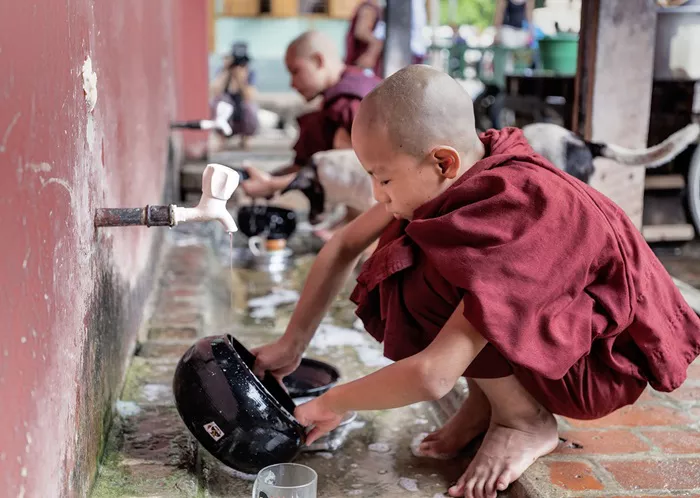Buddhist monks live a simple and mindful life. Their eating habits are not just about food but also about practice. Eating is part of their spiritual path. It reflects discipline, respect, and awareness. This article explains how Buddhist monks eat, why their habits are special, and how tradition guides them.
Understanding the Buddhist Monk Lifestyle
Buddhist monks follow strict rules in their daily life. These rules help them focus on meditation and spiritual growth. Food is an important part of their routine. They eat to live, not live to eat. Their lifestyle encourages moderation, mindfulness, and gratitude for what they receive.
The Role of Food in a Monk’s Life
Food is seen as fuel for the body, not pleasure. Monks avoid overeating and harmful foods. Their meals support health and energy for meditation. The way they eat helps them practice mindfulness—being fully aware of each bite.
How Buddhist Monks Obtain Their Food
Traditionally, monks do not cook or buy food by themselves. Instead, they go on alms rounds, called “pindapata,” where they receive food offerings from laypeople. This practice keeps monks humble and connected to the community.
The Tradition Behind Monastic Eating Habits
The eating habits of Buddhist monks come from the Buddha’s teachings. The Buddha set clear guidelines for monks’ food intake to support their spiritual journey.
The Vinaya: Rules Governing Monastic Food
The Vinaya is a set of monastic rules. It guides monks on what and when to eat. For example, monks traditionally eat only before noon and avoid solid food after midday. This helps keep their minds clear and free from distraction.
Simple and Modest Meals
Meals are simple, often consisting of rice, vegetables, and fruits. Monks avoid meat if it is not offered freely or if the animal was killed specifically for them. They accept what is given without preference or complaint, practicing gratitude and detachment.
The Buddhist Monks Hierarchy and Its Influence on Eating
In some traditions, the buddhist monks hierarchy influences food customs. Senior monks may have different roles during meals, such as eating first or receiving special offerings, reflecting respect and order within the community.
Mindfulness in Eating: A Core Practice
Mindfulness means paying full attention to the present moment. For monks, this includes eating with awareness.
How Monks Practice Mindful Eating
Monks eat slowly and carefully, noticing the taste, texture, and smell of each bite. They reflect on the effort behind the food, from the farmer to the donor. This awareness helps them avoid waste and appreciate the present moment.
Benefits of Mindful Eating for Monks
Mindful eating promotes self-control and peace. It reduces greed and craving. This practice supports the monk’s goal of overcoming attachments, one of the roots of suffering according to Buddhist teaching.
Fasting and Other Food Practices
Fasting is not common but sometimes practiced to deepen spiritual focus. Instead, monks follow the rule of eating only before noon, which naturally limits food intake.
The Importance of Moderation
Moderation in eating is essential. It helps maintain health and supports meditation. Overeating is avoided because it causes lethargy and disturbs mental clarity.
Special Days and Food Practices
On certain days, such as Uposatha (observance days), monks may observe stricter food rules or fast partially. These practices purify the body and mind and renew commitment to the path.
How Laypeople Support Monks Through Food
Offering food to monks is an important Buddhist tradition. It creates a bond between the monks and the community. Laypeople earn merit by giving food, and monks receive the energy they need for their practice.
The Alms Round Tradition
Monks walk quietly in the morning with their bowls. People offer rice and other simple foods. This tradition is a daily reminder of interdependence and generosity.
Respecting the Food Given
Monks accept all food offerings with respect, regardless of the type or quality. They do not show preference, demonstrating detachment and gratitude. This attitude teaches humility and compassion.
Conclusion
The eating habits of Buddhist monks teach us valuable lessons about simplicity and mindfulness. By eating with care and gratitude, monks show how food can support not just the body but also the mind and spirit. Their traditions remind us to live with less attachment and more awareness in daily life. Following their example can help anyone develop a healthier relationship with food and bring peace into everyday moments.

